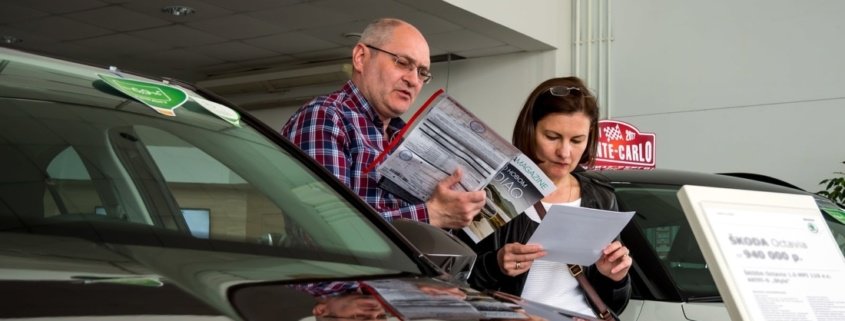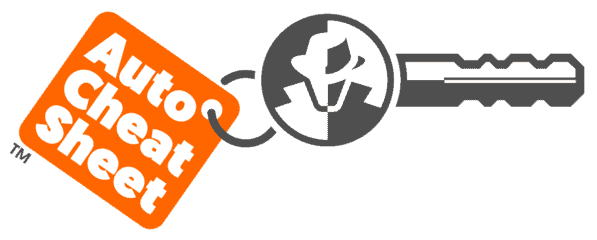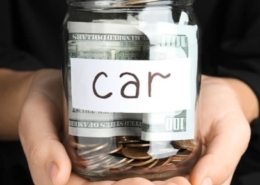New Car Price Terms You Need to Know
Knowing These Terms, Will Save You Money.
It is essential to be well-informed before shopping for a new car. Before you begin conducting any analysis, it’s a good idea to brush up on some of the most often used new car price terms so you have a basic understanding of what’s happening.
You may have difficulty researching your way to the correct information and negotiating the best price if you don’t grasp what they signify. I explain a few of the most common new car price terms below.
Table of Contents
- Must know new car price terms used in a dealership
- Manufacturer’s suggested retail price (MSRP)
- Sticker price
- Dealer invoice price / Factory invoice price
- Dealer cost
- Dealer holdback
- Out-the-door price
- Target price
- Dealer quoted price
- Destination fee
- Customer rebates & incentives
- Manufacturer incentives
- Regional ad fees
- Market adjustment
- Dealer add-ons
- Further tips and advice on new car price terms
Must Know New Car Price Terms Used in a Dealership
One thing that makes purchasing a car so stressful for many people is the volume of foreign languages. Car salesmen frequently use new car price terms like “dealer invoice,” “market adjustment,” and “sticker price.” But do you genuinely get what these terms mean?
You must grasp the subtleties of these price phrases if you want to obtain the best bargain. So I’ve created the following list to give consumers a basic understanding of the most common new car price terms they’ll encounter at the dealership.
Manufacturer’s Suggested Retail Price (MSRP)
MSRP stands for the manufacturer’s suggested retail price. It is the suggested retail price that a vehicle manufacturer provides to dealers.
The MSRP is only the beginning point for discussions at the dealership, but consumers should disregard MSRP while haggling. However, you can use MSRP to compare cars with similar features.
The MSRP, often known as the sticker price, is typically mentioned on a new vehicle spec sheet. In certain situations, it may not be stated. When cars are in high demand, dealers may remove or disregard the MSRP altogether.
The dealer will attempt to start discussions at a higher price if the MSRP is not published. It is important to note that the MSRP does not represent the “out-the-door” price you may expect to pay. Registration, penalties, travel fees, and other charges are not covered.
MSRPs are designed to safeguard buyers, but they are a minor part of the equation for finding a great deal on a car.
Is MSRP negotiable?
Yes. The manufacturer’s suggested retail price is negotiable.
Sticker Price
A new car’s MSRP is shown on a window sticker, technically known as a “Monroney label.”
As a result, the phrases “MSRP” and “sticker price” are sometimes used interchangeably.
All new automobiles for sale must have the Monroney Label visible by law.
Is the sticker price negotiable?
Yes. The sticker price is negotiable.
Invoice Price
The invoice price is the amount a car dealer pays the manufacturer for each vehicle.
When the dealer acquires a new automobile, the dealer invoice price is the amount indicated on a factory invoice provided by the manufacturer.
To keep it fair, every dealer in the United States pays the same price for the vehicle. However, this is not always the bottom dollar you can buy the car for.
Many people assume this new car price term is the actual dealer cost of the car, although this isn’t always the case. Dealer holdback, customer rebates, dealer incentives, or a combination of a few may be available. It will allow you to buy a car for less than the posted factory invoice price.
There is no reason to negotiate the invoice price.
This is the price of the vehicle to the dealership from the manufacturer.
Remember, the invoice price may not be the bottom dollar you can buy a new car.
Some dealerships have grown more open to presenting consumers with the actual invoice of the vehicle in recent years.
It is preferable to respectfully request to view the invoice price rather than demanding it as if it were your right.
Dealer Cost New Car Price Term
Dealer cost is the actual amount a dealer pays to the manufacturer for a new automobile, and it might be significantly lower than the dealer’s invoice price.
Most dealers would encourage you to assume that their lowest price is the dealer invoice. However, this is incorrect information; the real bottom line is the dealer cost.
To find the actual dealer cost of a new car. Take the invoice price, subtract dealer holdback, and any customer or dealer cash rebates or incentives. This will show you what the dealer paid for the new car.
Is dealer cost negotiable?
There is no reason to negotiate the dealer cost.
But you should know this number to calculate a fair profit new car offer. This is the actual cost of a new car after a dealer has subtracted any holdback, incentives, or rebates from the vehicle’s invoice price.
Dealer Holdback
The dealer holdback is a percentage of the dealer invoice or MSRP charged back to the manufacturer by the dealership. Manufacturers usually refund the proportion of money withheld every quarter. However, this varies based on the arrangement.
Not all car manufacturers include dealer holdback in their business models.
Only a few years ago, dealer holdback became prevalent. They are used to raise invoice rates to boost distributor earnings artificially. This is accomplished mainly by lowering the gross profit margin on the sale of a car. As a result, the salesman is not compensated as a proportion of the dealer’s holdback.
Another reason dealer holdbacks, generally two to three percent of MSRP, are popular is that they incentivize dealers to make exclusive deals while still earning a profit. Dealers are legally allowed to promote automobiles at invoice pricing before recouping hundreds of dollars later.
Although being aware of dealer holdback is beneficial, you are unlikely to be able to exploit them in your negotiations. It’s good to be mindful of them, but dealers tend to cling to them. You may be able to use them to negotiate a lower price indirectly.
Is dealer holdback negotiable?
Normally not negotiable.
Because it is essentially its money that the dealer owns. Most dealers are frequently dissatisfied with passing it on to the buyer.
However, some dealers desperate to make a car sale may negotiate some or even all of the amount to move the car off the lot.
Out-the-Door Price
The out-the-door price is one of the most important new car price terms you will want to know. The out-the-door price is your bottom line when acquiring a new vehicle, truck, or SUV.
This is the total amount you will pay for your new automobile in cash. That is, it covers tax, title, license, and any additional fees incurred from the dealership.
Once you have your “out-the-door” price, you can decide how much cash down you would like to put towards the vehicle. I recommend putting at least 15-20% down when purchasing a new or used car.
Take your “out-the-door” price, subtract your cash down, and that will give you the amount you will finance.
Is the out-the-door price negotiable?
Yes. The out-the-door price is negotiable.
Target Price
A target price should only be used as a guideline for you. It’s the price you are comfortable paying for the vehicle you want to buy.
You should never tell the dealer or car salesman what this number is. The ultimate goal is to buy the vehicle under your target price if the opportunity presents itself.
Your target price, or fair profit offer, should be somewhere between 2-5 percent over the actual dealer cost.
You can use free quote services such as RydeShopper and Edmunds to set a target based on current market conditions in your local area.
These online services will show you what others are paying in your market.
Is the target price negotiable?
There is no need to negotiate the target price.
You set the target price. Your target price is your “goal price” to buy the vehicle. It would be best if you were willing to pay less than your target price. If you’re unable to reach your goal, you will have to decide how badly you want to buy the vehicle.
Remember – Do not tell anyone your target price.
Dealer Quoted Price
This is the price you are quoted from the dealer, typically when shopping for a new car online. It can also be the quote given to you over the phone by a car salesman.
Even though it’s not the out-the-door price and doesn’t usually include tax, title, and tag, it’s a good number to compare pricing with similarly equipped cars.
Is the dealer quoted price negotiable?
Yes. The dealer quoted price is negotiable
Destination Fee
Auto production factories must transport new vehicles to dealer lots. The manufacturer charges the dealer for this, which is passed on to the consumer. The correct new car price term for this is called a destination fee.
The total amount is usually in the hundreds of dollars. As appealing as it would be to bargain these amounts down, it is just not possible. The figure varies depending on the kind and manufacturer, although it has little to do with the cost of shipping the vehicle.
The destination fee is one of many standard dealer fees you may encounter when buying a new car. Whenever presented with additional costs at a dealership, always read and understand what they are and if you are obligated to pay them.
Are destination fees negotiable?
No. Destination fees are rarely negotiable.
The cost is passed on to you from the manufacturer through the dealer.
It depends on how desperate the dealer is to sell a car. In rare instances, you may be able to negotiate a price reduction with the car dealer to cover all or a portion of the destination charge.
Customer Rebate and Incentive
The most frequent manufacturer rebates and incentives should benefit customers. Special lease rates, low-interest financing, and cash incentives are occasionally provided to promote purchases.
These incentives are frequently advertised as first-time buyer programs, low-interest special events, employee plans, military discounts, and other perks.
These advantages reduce the vehicle’s net price. Although it is uncommon to have concurrent incentives, you are usually forced to pick between a refund and a financing incentive.
You may use an online calculator to determine whether a cash back rebate or a low-interest incentive is correct.
Are customer rebates & incentives negotiable?
No, they are not negotiable.
Because these kinds of incentives come directly to you from the manufacturer, the dealer has little leverage to negotiate them.
Always research beforehand to see if the vehicle you want to buy has any of these types of discounts available.
Most online price quote services automatically include rebates and incentives when providing quotes to online car shoppers.
Manufacturer Incentive
Dealer incentives usually are unadvertised money that lowers the dealer’s actual cost of purchasing the car from the manufacturer. Manufacturers provide these incentives on a regional basis to increase sales of specific models.
These incentives are frequently referred to as dealer “spiffs.” They might cause dealers to compete to get rid of slower-selling stock. For example, an incentive might be activated when a particular sales target is met, with each subsequent sale resulting in a more significant factory-to-dealer rebate.
There are many different new car price terms to describe dealer incentives. Below are a few:
Common types of dealer incentives:
- Cashback – The most common dealer incentive.
- Finance incentives – Prevalent to hook customers into buying.
- Bonus cash
- Dealer cash
- Salesman bonus
- Lease deals
- Loyalty programs
- Dealer rewards
Dealer incentives might take the form of a lower purchase price for the dealer, a cash payout, or a monetary stimulus, such as a consumer refund.
Are manufacturer incentives negotiable?
Yes. These types of incentives are negotiable.
This extra cash gives the dealer more negotiating power and flexibility in moving older inventory off the lot to make room for new model year vehicles.
Keep in mind that you should do your research on this information upfront. Many dealers will not willingly advertise these types of discounts to the public.
Regional Advertising Fee
In the great majority of situations, regional ad rates are not negotiable. This is because they are generally listed on dealer invoices and are a fixed component of a dealer’s cost. They allow suppliers to recuperate any expenses for advertising and selling particular models.
You can be sure that if you see this cost on the dealer invoice, it will also be on your sales contract.
However, the manufacturer invoice does not include these charges in some instances. You may have some leeway if it does not, but they are included in your sales contract. It all relies on the dealer’s flexibility and the amount you’re paying.
Before going to the dealership, look up a list of regional marketing costs per manufacturer online. This will give you a better sense of how much these costs will cost you if you purchase a new vehicle.
Are regional ad fees negotiable?
This fee is not negotiable if listed on the vehicle’s factory invoice.
It does not mean you can’t ask for the vehicle’s price to be discounted by the same amount as the fee. The worst thing that happens is the dealer says, “no.”
One thing to keep in mind: for these fees to be valid, they must be included on the car invoice. If a dealer attempts to add on an advertising cost not stated on the invoice, they are trying to increase their earnings.
Market Adjustment New Car Price Term
Also known as “Additional Dealer Profit (ADP), “Dealer Adjustment,” or “Additional Dealer Markup (ADM),” dealer markups fall under this category. These are the costs to be on the lookout for and, if at all feasible, avoid.
A market adjustment is an additional markup to the window sticker that can add hundreds or even thousands of dollars to the manufacturer’s sticker price. These markups are typically found on the addendum sticker beside the Monroney Sticker on the side of the vehicle.
Market adjustments are typically observed with newly produced, highly anticipated modern cars or those with a long customer waiting list.
You can try to bargain for a lower price, but if the vehicle sells well, the dealer will have little motivation to cooperate with you. If you must be the first on your street with a hot new model, this will be the price you must pay.
However, if you can be patient and wait a few months before purchasing, these dealer modifications will generally disappear after the demand has cooled off and the supply is ample.
Once supply and demand level off, the markup will become additional depreciation; there are few situations where you’d be able to reclaim that money.
Are market adjustments negotiable?
Yes. Market adjustments are negotiable.
However, you may not get very far in receiving a discount when the supply and demand are in the dealer’s favor. They know if you don’t buy the car, someone right behind you will.
You can always try, but the smart move would be to wait a few months until the vehicle’s popularity and demand die down.
Remember, when you pay hundreds, or thousands of dollars, over the MSRP of a vehicle. You will be putting yourself in a bad situation when you are ready to trade in the car in the future.
Dealer Add-on
Anything a dealer installs on a car that didn’t come from the manufacturer is known as a dealer add-on or dealer-added option. These extras are often not covered by the manufacturer’s warranty and do not need to be approved by the carmaker.
Pinstriping, VIN-etching, nitrogen, graphics, wheel locks, gold packages, sunroofs, spoilers, ground effects, chrome wheels, fuzzy dice, and curb feelers are just a few examples of dealer-added accessories.
Keep in mind that although a dealer add-on is listed on the vehicle. You should make sure the dealer installed it before taking delivery.
Are dealer add-ons negotiable?
Yes. Dealer add-ons are negotiable.
Such customary add-ons are negotiable and might be removed from the total transaction cost; however, with some dealers, that isn’t easy to achieve.
Further Tips and Advice About New Car Price Terms
It would be best if you didn’t worry about memorizing these new car price terms. Just read through them so you have a basic understanding of what each term means if you’re confronted with them.
Dealers are excellent at shuffling and manipulating fees and numbers. They play the car buying game well and have been doing it successfully for decades.
One of the best things you can do to level the playing field is to do your automobile shopping online before ever stepping foot into a dealership.
Some of the best online car buying sites will allow you to request free new car price quotes to compare shop dealerships when you use an online service to contact dealerships.
They know you’re gathering prices from more than one dealership and that they better send you a low price, or you will never contact them again.
When you use competition to your advantage, the dealers can move all the numbers around they want. You don’t care where they go as long as they provide you with their bottom line price for which you can buy the car.
If you’re unsure where to start the car buying process, my new car buying cheat sheet will walk you through the entire process and help you get a great deal and avoid any unethical car dealer scams.










